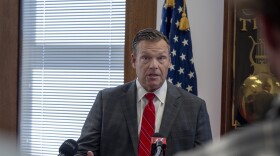WICHITA, Kansas — As more Kansas school districts report rising cases of COVID-19 and virus-related quarantines, educators are having to navigate a new state law that limits what they can offer online.
That’s already having an effect on school schedules in Wellington, where officials abruptly closed all schools through Labor Day and sent students home without a remote-learning option because of COVID-19 outbreaks.
Beginning Sept. 7, the Wellington district will add 10 minutes to the end of each school day to comply with state guidelines for the minimum number of instructional hours.
A measure Kansas lawmakers passed last spring — House Bill 2134 — was intended as a message to districts: Kids should be in school, in person.
The new law dictates that long-term online or hybrid learning models — anything over 40 hours per student per year — could mean losing up to two-thirds of state funding for that student.
The law allows districts to offer online options, such as Wichita’s Education Imagine Academy. But students enrolled in traditional in-person schools cannot go fully remote.
Mark Tallman, a lobbyist with the Kansas Association of School Boards, said there are lots of questions about the new law, which allows some exemptions for health issues or emergencies.
“What I think legislators objected to was districts just saying, ‘We’re going to operate for all kids in a hybrid or remote environment because we don’t want the schools to be open,’ ” he said.
“If you’re in a situation where a student either has COVID and is missing or would be quarantined, that’s tied to an individual student with a specific health issue. . . . That’s a different situation than the law was designed to deal with.”
Ultimately, the Kansas Department of Education will decide what hours count when it audits attendance figures.
In Wichita, the state’s largest district, more than 1,600 students have missed school due to COVID isolation or quarantine protocols. Beginning Sept. 8, the district plans to offer “simultaneous learning” for students who are not able to attend class in person.
According to the new plan, teachers will lead their in-person class as normal, and the quarantined student will watch lessons through video conferencing. A paraeducator or buddy student will monitor the remote student, respond to questions by chat and share the student’s questions with the teacher.
Teachers instructing an in-person class and a remote student will be paid an additional $50 a day.
“I know the need for limited remote learning will still remain,” Deputy Superintendent Gil Alvarez said in an email to employees.
Allowing quarantined students the option to tap into classrooms via computer “is a reasonable compromise in order to assure the greatest possible opportunity for our students to receive instruction directly from our teachers,” he said.
Between Aug. 2 and Aug. 25, the Wichita district reported 466 positive COVID cases among students and 84 cases among employees.
At least 133 employees were under quarantine.
District officials said they are tracking but not reporting or publishing the number of quarantined students.
The Kansas Department of Health and Environment this week reported 21 active COVID-19 clusters at schools — 14 more than the previous week — with at least 114 positive cases.
Only two school outbreaks were publicly identified by the state: Mount Olive Lutheran School in Overland Park and Central Elementary School in Lyons.
Suzanne Perez reports on education for KMUW in Wichita and the Kansas News Service. You can follow her on Twitter @SuzPerezICT or email her at perez@kmuw.org.
The Kansas News Service is a collaboration of KCUR, Kansas Public Radio, KMUW and High Plains Public Radio focused on health, the social determinants of health and their connection to public policy.
Kansas News Service stories and photos may be republished by news media at no cost with proper attribution and a link to ksnewsservice.org.
Copyright 2021 KMUW | NPR for Wichita. To see more, visit KMUW | NPR for Wichita. 9(MDA4OTAxNzAzMDEzMjc0MTc2MzA5ZDZlMw004))








